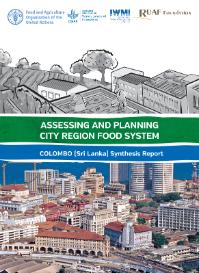Assessing and Planning City Region Food System Colombo (Sri Lanka) Synthesis Report
Resource information
Date of publication
Agosto 2018
Resource Language
ISBN / Resource ID
FAODOCREP:CA1159EN
Pages
90
License of the resource
Copyright details
© FAO. FAO is committed to making its content freely available and encourages the use, reproduction and dissemination of the text, multimedia and data presented. Except where otherwise indicated, content may be copied, printed and downloaded for private study, research and teaching purposes, and for use in non-commercial products or services, provided that appropriate acknowledgement of FAO as the source and copyright holder is given and that FAO's endorsement of users' views, products or services is not stated or implied in any way.
This report is the result of the implementation of an assessment methodology for Colombo and its city region food system (CRFS).
Colombo stands as a unique city in Sri Lanka due to the complexity of its socio-demographic profile and the diverse food items that arrive through multiple channels. The busy and complex lifestyle of its inhabitants, together with the floating population of the city, creates a high demand for catering services that supply prepared food for direct consumption. In addition, the Colombo Municipal Council (CMC) acts as the national hub for imported food items and the regional hub for vegetable and fruit. As a result, Colombo has one of the most complex food systems in Sri Lanka. The aims of the CRFS assessment include: to better understand the functioning the Colombo food system; to examine the current and future constraints on food security and safety, with respect to the challenges of urban growth, diversity, lifestyle and dynamics; to explore the sustainability and resilience of the Colombo CRFS; and to seek to improve the livelihoods of rural and urban dwellers now and in the future.Geographical focus


